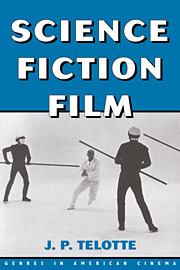Book contents
- Frontmatter
- Contents
- List of Illustrations
- Acknowledgments
- PART I APPROACHES
- PART II HISTORICAL OVERVIEW
- PART III FILM ANALYSES
- 4 The Science Fiction Film as Fantastic Text: THX 1138
- 5 The Science Fiction Film as Marvelous Text: Close Encounters of the Third Kind
- 6 The Science Fiction Film as Uncanny Text: RoboCop
- 7 Crossing Genre Boundaries/Bound by Fantasy: The Fly (1986)
- 8 Conclusion: A Note on Boundaries
- Notes
- Bibliography
- Select Filmography of the American Science Fiction Film
- Index
6 - The Science Fiction Film as Uncanny Text: RoboCop
Published online by Cambridge University Press: 03 December 2009
- Frontmatter
- Contents
- List of Illustrations
- Acknowledgments
- PART I APPROACHES
- PART II HISTORICAL OVERVIEW
- PART III FILM ANALYSES
- 4 The Science Fiction Film as Fantastic Text: THX 1138
- 5 The Science Fiction Film as Marvelous Text: Close Encounters of the Third Kind
- 6 The Science Fiction Film as Uncanny Text: RoboCop
- 7 Crossing Genre Boundaries/Bound by Fantasy: The Fly (1986)
- 8 Conclusion: A Note on Boundaries
- Notes
- Bibliography
- Select Filmography of the American Science Fiction Film
- Index
Summary
What is experienced as uncanny is an objectification of the subject's anxieties, read into shapes external to himself.
–Rosemary JacksonSince the early 1980s, the figure of the robot, android, replicant, or cyborg has contributed what is probably the single most dominant image to the American science fiction film [Fig. 59]. Particularly, the appearance of the film Blade Runner (1982) marked a rising fascination in the cinema – and certainly in American culture – with the possibilities of a human artifice, a fascination traced out in short order in such films as Android (1982), the two Terminator films (1984, 1991), D.A.R.Y.L. (1985), Making Mr. Right (1987), the three RoboCop films (1987, 1990, 1993), Cherry 2000 (1987), and Eve of Destruction (1991), among many others. These films speak immediately of a growing cultural concern with what might be described as an industry of human synthesis, one involving the creation and transplanting of artificial organs, the development of mechanical prostheses, the manipulation of human genetics, the widespread availability of cosmetic surgery, the introduction of industrial robots into the workplace, and especially the development of artificial intelligence. They chronicle – and in complex ways respond to – the start of nothing less than a cultural revolution, one in which we would begin the process of remaking, reshaping, perhaps even perfecting the self, while at the same time germinating the technology that could eventuate in these same technological creations finally replacing the self.
- Type
- Chapter
- Information
- Science Fiction Film , pp. 161 - 178Publisher: Cambridge University PressPrint publication year: 2001
- 1
- Cited by

